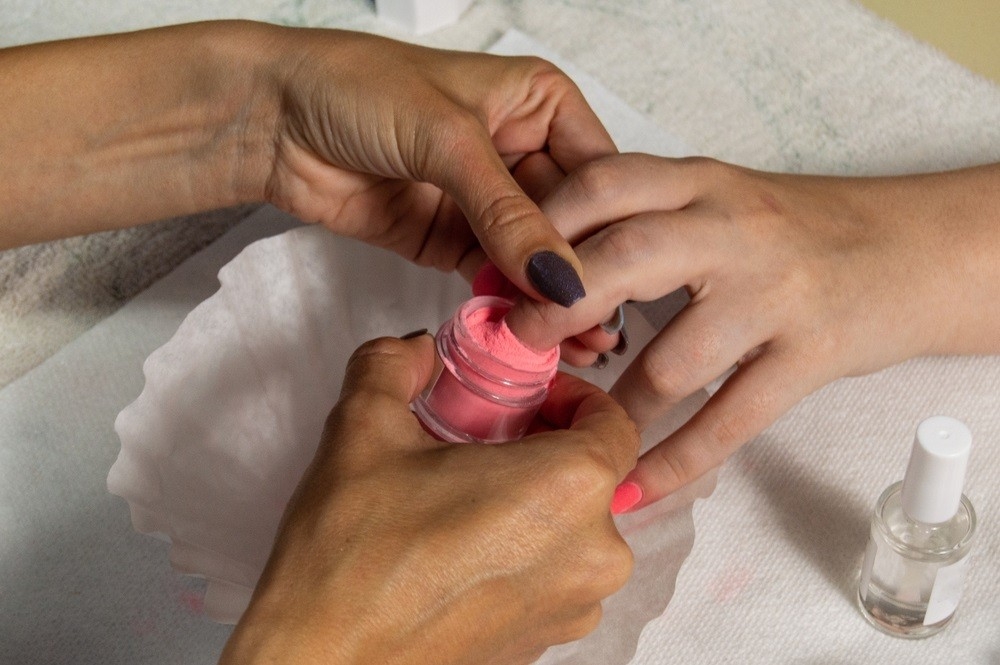Contents
- What are dip powder nails?
- Dip nails vs. gel nails
- Dip nails vs. acrylic nails
- The benefits of dip powder nails
- Paint can be applied over powder dip nails
- Dip powder strengthens the feel of your natural nails
- Nails coated in dip powder are less prone to chipping
- For creating gradient and ombré nail designs, dip powder is effective
- Dip powder nails are diy-friendly

Fresh tips can put the finishing touch on your beauty or self-care routine if you consider your nails miniature works of art or canvases for color. However, various manicure possibilities exist, and not all ways to apply color are comparable, particularly in their endurance.
Dip powder manicures are in a class of their own because of their exceptional ability to last, even for individuals who can be harsh on their hands. Regular and gel polishes can be prone to chipping and peeling. Anna Parvatova, creative director of SNS Nails, says, “Dip powder nails are a manicure procedure that combines colored powder with certain bases and sealers to create stunning, long-lasting manicures.” Dip nails are robust like acrylics but lighter and more flexible than gel nails. Even though dip manis aren’t new, their popularity has recently increased. Thus some of the specifics of the process might still be a little hazy. Because of this, we’ve broken down the dipping procedure here to provide you with all the information you might need to know if you decide to DIY this technique at home or a salon. Here is all the information you require about dip powder nails. Please visit Maby blog to update the latest nail news.
What are dip powder nails?
Dip nails are one of the longest-lasting nail paint applications available today. They sit halfway between acrylic and gel nails. Dip powder nails, as the name implies, entail dipping your nails into a colored powder that coats the nail like a typical lacquer.
As with any other manicure, the first step in getting dip powder nails is removing any nail polish, shaping and filing your nails, and pushing back your cuticles. The pins are then polished and cleaned to eliminate any oils that could lead to chipping or lifting.
The nail is then given a clear base coat to prepare for the dip powder. Although they may appear identical, the base layer for a gel manicure and conventional nail paint differ. After applying the base coat, the nail technician will brush or pour the dip powder.
When you have an even layer of an opaque color, they’ll repeat the “dipping” procedure after brushing off any extra powder and applying another layer of base coat. The nail technician will apply a layer of transparent powder and a coat of sealant after you are satisfied with the color.
To ensure that the dip powder is flat and smooth, they will file down your nails to complete the process. After a quick hand wash, your dip powder nails are prepared for their top coat. Your nails may be finished with a conventional or UV gel topcoat at the salon.
Dip nails vs. gel nails
The most significant distinction between these nail treatments is that gel nail paint requires curing under a light, whereas dip powder nails do not. Gel nail paint is a little thinner and more pliable than dip powder, strengthening your nails by adding a hard layer. Because dip powder nails can go up to a month without chipping, many people appreciate them. Gel nails usually don’t chip for two to four weeks.
Dip nails vs. acrylic nails
Dip powder is chemical-free and can be used on natural nails or for longer-lasting nail enhancements, whereas acrylic powder and dip powder are artificial nail enhancements. Because of the monomer that holds acrylic powder to your nails, it is a chemical with a strong odor.
Due to its shareability, acrylic works better for treatments like mending broken nails and nail lengthening. Typically, acrylic is a substance used to increase and shape your nails, and dip powder is a pigment used to paint them. Gel or natural nail polish is then added on top.
The benefits of dip powder nails
The benefits of dipping powder nails outweigh the drawbacks. The top five advantages of dip powder nails are listed below.
Paint can be applied over powder dip nails
Yes, you can paint over dip powder nails, and if you’re attempting to grow your nails, this trick is ideal. Request that your nail technician applies one clear dip powder coat before covering it with conventional or gel paint. Your nails will feel more sturdy as a result, enabling you to grow them longer.
Dip powder strengthens the feel of your natural nails
Thanks to dipping powder, your nails are covered in a rugged, protective layer. Dip powder is a great way to strengthen your nails as they heal and grow stronger if they are weak or feel like they will break.
Nails coated in dip powder are less prone to chipping
Dip powder, as previously discussed, creates a strong, protective layer over your nails, making them less likely to chip. Dip powder nails can be an excellent solution if your biggest pet peeve is a manicure that chips.
If your dip nails do chip, it’s because the preparation before applying the powder was insufficient in some way. When the powder is used, your cuticles may get oily or go on your claws.
For creating gradient and ombré nail designs, dip powder is effective
They’re excellent for producing gradient designs like ombré nail art because of the particles that make up dip powder. Instead of mixing the colors with a brush to create the gradient effect, your nail artist will apply a base coat and powder to the tip of your nail.
Dip powder nails are diy-friendly
Dip powder nails are a wonderful place to start if you want to try out salon manicure services at home because they don’t need specialized tools like a UV lamp or an e-file. The proper base coat, dip powder, top coat, and nail file are required. Although practice makes perfect, we advise concentrating on preparation before painting your nails to prevent chipping or lifting from your dip manicure.
Maby constantly updates new nail salons opening in the city with trending nail designs. Come with us!
